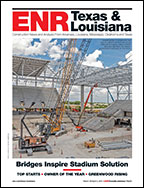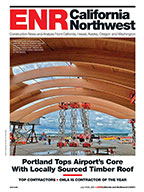
After a technical report by German structural engineer and roof specialist SBP revealed structural flaws in the roof of the stadium in Rio de Janeiros' Engenho de Dentro neighborhood, Mayor Eduardo Paes ordered the facility to be closed until the necessary repairs are completed. The engineers' report was ordered by Odebrecht and OAS, members of the Brazilian consortium that is rehabbing the six-year-old facility to host track-and-field events for the 2016 Summer Olympic Games. When he announced the shutdown in late March, Paes said the corrective measures would not affect the opening of the Olympics.
Structural analysis revealed corrosion in steel tubes that are part of the roof support system. The stadium's cover comprises forty-two 50-meter-long trellised scissors held by beams. With those elements, the structure forms a triangle that provides lateral stability to the large arches, which are composed of two 221-m-long and two 163-m-long circular tubes. Loads imposed by winds exceeding 63 kilometers per hour could cause the tubes to fail, according to the report.
The João Havelange Stadium—named after the 1974-98 Brazilian president of FIFA, soccer's international governing body, and popularly known as the Engenhão Stadium—has been plagued by problems since its construction for the 2007 Pan-American Games. Originally budgeted at $40 million reais, or about $20 million, Engenhão came in at $380 million reais, or about $191 million.
Noting construction delays and budget explosions in connection with the 2016 Summer Olympics, critics in Brazil say the 2007 Pan-Am Games were marked by several problems that are likely to be repeated here. For example, while organizers promised the João Havelange Stadium would provide opportunities for investment in the surrounding Engenho de Dentro neighborhood, even the access routes to the stadium itself remain precarious and unsafe for crowds.
The consortium responsible for the original construction, which included local firms Delta and Recoma, was replaced after irregularities in the contractural process came to light. Odebrecht and OAS came aboard for the second phase of construction; however, during the interim, costs escalated to nearly 10 times the original estimate, and preventative maintenance was not carried out.
But both Mayor Paes and the International Olympic Committee remain confident the stadium will be ready for the 2016 Summer Olympics. Says IOC spokesman Mark Adams, "We have been in contact with the organizers of Rio 2016 regularly, and we are certain that everything will be done for the success of this great international sports event."






Post a comment to this article
Report Abusive Comment